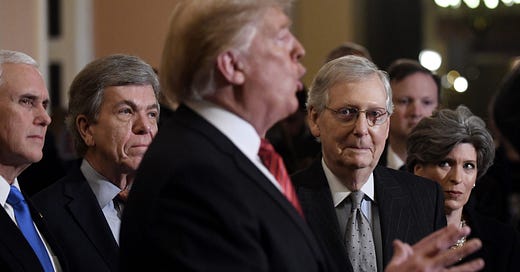
Silence of the Reluctant Trumpers
Like all recent chief magistrates, Donald Trump has attracted both apologists and assailants. Yet between “Forever Trump” and “Never Trump” lies a cohort that has reconciled itself to the president while retaining its regrets: “Reluctantly Trump.”
This group, large enough to form a caucus in Congress, includes many former critics of the president who have made their peace with Trump for a variety of reasons: the judges, the deregulation, the tax cuts, or the conclusion that, on the whole, he surpasses the available alternatives. The question is not whether these reasons are defensible—they are—but rather whether this group’s silence in the face of reprehensible presidential conduct is.
One of Trump’s guiding mantras is “never apologize.” The guiding mantra for Reluctant Trump supporters is “never condone, never condemn.”
But there is a point at which this posture becomes untenable. Trump’s latest reprehensibility—his call for Democratic congresswomen known as “the squad” to go back to where they came from—by which the president did not mean Chicago (Ayanna Pressley), Detroit (Rashida Tlaib), the Bronx (Alexandria Ocasio-Cortez) or the naturalization ceremony (Ilhan Omar)—may be it.
Trump’s bigotry—call it “racism,” call it “xenophobia,” or call it “the kind of behavior that forces conservatives into such distinctions”—is rooted in the assumption that people belonging to ethnic minorities are permanent strangers, here on the sufferance of “real Americans” so long as they keep their mouths shut. If Trump’s defenders have a more benign interpretation of his remarks, they have not offered it.
And if the Reluctant Trumpers disapprove, they are similarly keeping it to themselves. Their tacit consent to the president’s behavior is the apparent result of his wholesale conquest of the Republican party. Trump’s approval rating among Republicans tops Ronald Reagan’s. The olden days when figures such as the Republican speaker of the House felt compelled to at least issue pro forma condemnations about such incidents—for instance, Trump’s description of U.S. District Judge Gonzalo Curiel (born in East Chicago, Indiana) as a “Mexican” who was consequently too biased to preside over the Trump University case—have passed.
In another era—which is to say a couple years ago—Mitch McConnell, the Senate majority leader, spoke out against the ban on immigration from Muslim-majority countries, even if he feebly suggested that the courts rather than his own branch of government ought to resolve the controversy. On Sunday, after the president’s bigoted tweetstorm, Republican members of Congress, many of them members of the Reluctantly Trump persuasion, were silent.
There should be lines that this or any president cannot cross without incurring criticism from his own side. That’s because the boundary between neutrality and tacit consent—between their failure to condemn and the suggestion that they condone—may be faint, but it exists. Enabling, like pornography, is difficult to define, but sensible observers generally know it when they see it. Among of its markers is the refusal to use one’s influence to improve a situation one purports, at least privately, to deplore.
That influence is considerable. The president can write off Never Trumpers. But he needs the Reluctant Trumpers in Congress to pass legislation and provide a veneer of respectability, or at least tolerability. They are equally crucial in expanding his electoral base, which the president must do to secure the popular majority he craves. The Reluctant Trumpers may therefore be both uniquely positioned to influence his conduct and uniquely responsible for doing so.
This is not to say that Reluctant Trumpers are required to condemn every presidential vulgarity. That would be a full-time occupation. More important, there is nothing inherently unwise in choosing to stay on the sidelines rather than be sucked into the unrelenting conflict between Trump and his critics. If anything, one of the president’s uglier influences has been to draw everyone into perpetual combat, and the Reluctant Trumpers’ refusal to rush the field for every play is often prudent.
But there are moments when their voices are needed and when their silence is consequently indistinguishable from acquiescence. If this is not one, it is difficult to conjure what might be. Xenophobia of the kind Trump expressed is a particular offense against American values. Moreover, its normalization is especially dangerous amid the creeping spread of ethno-nationalism. Yes, nations and borders matter, but American nationhood is uniquely rooted in commitments incompatible with bigotry.
The Reluctant Trumpers’ affinity for Trump’s policies, many of which are political sops to them rather than principled convictions, cannot permanently outweigh his conduct. It was once a conservative belief, dating to Burke and Tocqueville, that manners and mores—not just laws or, in the parlance of our times, executive orders—defined a society. Presidents are not policy replicants: Policies matter, but so does who propounds them, and how.
And the vacuity of the far left, which seems determined to prove the Reluctantly Trump claim that the president is better than the alternatives, is no excuse for silence on presidential misconduct. Nor is the left’s egregious behavior, such as the comparison of odious immigrant detention centers to concentration camps.
Leftist excesses ought to be condemned too, but the first responsibility of each side is to police itself.
Silence, of course, can be wisdom. But it can also be complicity. If bigotry becomes a normal feature, even an explicit commitment, of what lately travels under the banner of American conservatism, then the Reluctantly Trump persuasion’s neutrality will bear a good deal of responsibility.










